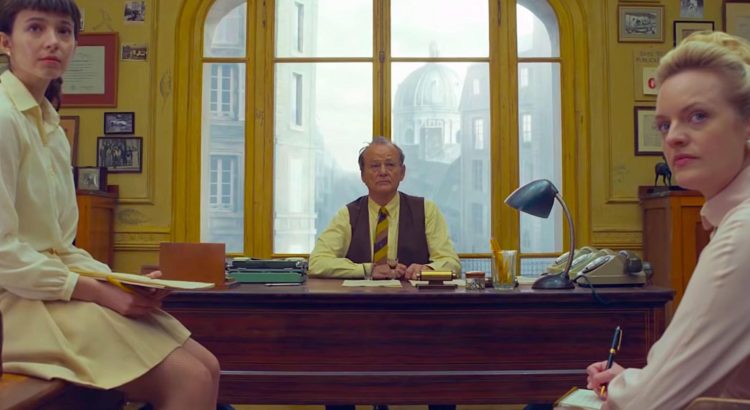The French Dispatch is a display of director Wes Anderson’s uninhibited ambition, manifesting itself in a whirlwind of drama and colorful characters. The film does not stick to a single narrative but rather tells three stories in long segments. Each story is a vignette written by a journalist for The French Dispatch, an international outpost of an American newspaper that operates in a dreary French town by the name of Ennui-sur-Blasé. Everything is mundane— even the name of the fictional town translates to “boredom-on-apathy”— except for the dedicated journalists, the invigorating stories they release to the world, and the eccentric people involved in the stories. Thus the typical Anderson irony begins. This film is, at its core, a celebration of journalists and a love letter to all things literary and artistic. It is an Anderson classic: upbeat, artistic, and a bit pretentious, but its unfamiliar structure makes it feel fresh.
Each scene is rich with deadpan humor, rarely outright saying a joke but implying it in every corner of the frame. The juxtaposition of the still-faced, sharp-tongued characters and their chaotic predicaments against the colorful backdrop feels unnatural, as is the constant narration that overlays the stories, but they both add to the unique nostalgia of the film. Rather than experiencing the stories myself, I am being guided through them like a picture book. The visuals add to the book-like atmosphere— black-and-white scenes, entirely animated scenes, and experimental lighting exaggerate the easily-missed emotions. The world is symmetrical, well-color-coordinated, and moving in synchronicity, just as a storybook world should. Wes Anderson’s films stick with me for this reason— not because they are believable in the slightest but because they revive a childlike amusement. The unrealistic twists and turns in each segment are comical and effortlessly engaging. However, the sentimentality of his films is usually amplified by emotional depth. This is where The French Dispatch falters. The three-story structure and quick pace refuse to allow us to get attached to one character for too long or watch the slow development of relationships. I gravitated toward the recognizable faces and quirky personalities (such as the mustache-wearing and disheveled teenage rebel played by Timothée Chalamet) but the characters disappear shortly after they serve their purpose.
The French Dispatch manages to be a sensory feast on top of an exciting tangle of stories but the combination is nearly exhausting. From the hard-to-catch humor to the drastic time jumps, I attempted to absorb everything yet desperately needed to let my senses rest. It is also overwhelming in its organization, as the stories have no connection besides the journalists publishing them, so the film is difficult to process as a sum of all its parts. The French Dispatch is not a casual watch if you want to enjoy all its beauty; it requires patience, energy, and an attention span, and an estimated two or three watches.
As a sum of its visuals, script, and diverse storylines, each element of The French Dispatch is crafted in a way that maximizes Anderson’s quirky innocence and childlike fun. Anderson may have been trying to emphasize too much of his signature style in one film, resulting in entertainment so constant that it is almost nauseating. The French Dispatch is an exhilarating masterpiece but it is a masterpiece that needs to be prepared for.


